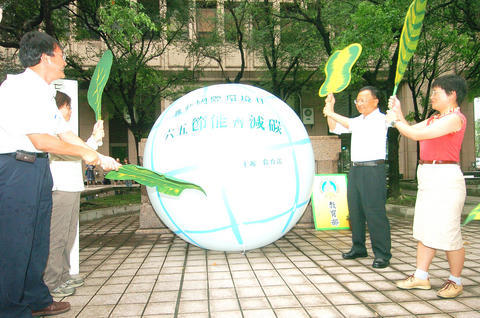The Ministry of Education is aiming for zero growth in school energy consumption this year amid the nation's soaring greenhouse gas emissions, Minister of Education Tu Cheng-sheng (杜正勝) said yesterday on the eve of World Environment Day.
A UN holiday promoting awareness of environmental issues, World Environment Day is typically an occasion used by government officials to address the nation's alarming carbon dioxide emission levels. In a press conference yesterday, Tu expressed concern for what he said was the yearly growth in energy consumption by schools nationwide, leading to further emissions of greenhouse gases.
He warned against cranking up air conditioners and called on students to wear cool, light attire as the summer approaches.

PHOTO: WANG MIN-WEI, TAIPEI TIMES
"If that which can be saved or cut down on isn't being saved or isn't being cut down on, you're being wasteful," Tu said.
The ministry plans to distribute energy saving and consumption monitoring technologies to more schools, it announced in a statement yesterday. Senior high schools and vocational schools nationwide, it said, were subsidized last year and in 2005 to install such technologies, leading to a "2 percent to 3 percent" reduction in consumption.
But the focus yesterday wasn't totally on Taiwan. Tu saved many of his remarks for China, which he slammed as "backward" for relying chiefly on coal for its energy needs. China's economic rise, he said, has led to an explosion in energy consumption there and, with that, "a daily worsening of pollution."
Environmental experts here, however, panned the government for "irresponsibility in its rampant increase of carbon dioxide emissions," saying that the nation's modest geographic size yet relatively high level of development make emissions levels inexcusable.
Unleashing more than 2.17 million tonnes of carbon dioxide into the atmosphere annually, or nearly 1 percent of the global total, Taiwan churns out more greenhouse gases than all but 21 nations, according to the Environmental Protection Administration.
"It's pretty bad," said Linda Arrigo of the Green Party Taiwan, a political party dedicated to protecting the environment, referring to the country's carbon dioxide emissions.
"Taiwan has doubled its carbon dioxide emissions since 1990, the year of the Kyoto Protocol, which aims to spur nations to gradually decrease such production," she said.
By more than doubling its greenhouse gas emissions from 1990 to 2005, according to official statistics, Taiwan's energy policies run counter to the spirit of the protocol, Arrigo said.
"It's outrageous," she said.
Speaking to the Taipei Times on condition of anonymity yesterday, a senior foreign trade official familiar with environmental issues here agreed, saying that "a negative de-coupling" in which the country's carbon dioxide emissions soar while its GDP drops, begs to be inverted.
But that's unlikely to happen in the near future because of the projected growth in carbon dioxide emissions, Arrigo said.
Steel and petrochemical plants scheduled to go online in Yunlin County, Arrigo said, would add approximately another 20 percent to the nation's greenhouse gas emissions.
"It's nice that schools want to decrease their energy consumption and carbon dioxide emission levels," she said. "But that's just a tiny fraction of the problem."

An essay competition jointly organized by a local writing society and a publisher affiliated with the Chinese Communist Party (CCP) might have contravened the Act Governing Relations Between the People of the Taiwan Area and the Mainland Area (臺灣地區與大陸地區人民關係條例), the Mainland Affairs Council (MAC) said on Thursday. “In this case, the partner organization is clearly an agency under the CCP’s Fujian Provincial Committee,” MAC Deputy Minister and spokesperson Liang Wen-chieh (梁文傑) said at a news briefing in Taipei. “It also involves bringing Taiwanese students to China with all-expenses-paid arrangements to attend award ceremonies and camps,” Liang said. Those two “characteristics” are typically sufficient

A magnitude 5.9 earthquake that struck about 33km off the coast of Hualien City was the "main shock" in a series of quakes in the area, with aftershocks expected over the next three days, the Central Weather Administration (CWA) said yesterday. Prior to the magnitude 5.9 quake shaking most of Taiwan at 6:53pm yesterday, six other earthquakes stronger than a magnitude of 4, starting with a magnitude 5.5 quake at 6:09pm, occurred in the area. CWA Seismological Center Director Wu Chien-fu (吳健富) confirmed that the quakes were all part of the same series and that the magnitude 5.5 temblor was

The brilliant blue waters, thick foliage and bucolic atmosphere on this seemingly idyllic archipelago deep in the Pacific Ocean belie the key role it now plays in a titanic geopolitical struggle. Palau is again on the front line as China, and the US and its allies prepare their forces in an intensifying contest for control over the Asia-Pacific region. The democratic nation of just 17,000 people hosts US-controlled airstrips and soon-to-be-completed radar installations that the US military describes as “critical” to monitoring vast swathes of water and airspace. It is also a key piece of the second island chain, a string of

The Central Weather Administration has issued a heat alert for southeastern Taiwan, warning of temperatures as high as 36°C today, while alerting some coastal areas of strong winds later in the day. Kaohsiung’s Neimen District (內門) and Pingtung County’s Neipu Township (內埔) are under an orange heat alert, which warns of temperatures as high as 36°C for three consecutive days, the CWA said, citing southwest winds. The heat would also extend to Tainan’s Nansi (楠西) and Yujing (玉井) districts, as well as Pingtung’s Gaoshu (高樹), Yanpu (鹽埔) and Majia (瑪家) townships, it said, forecasting highs of up to 36°C in those areas